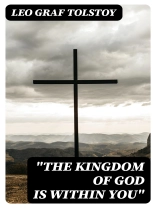In ‘The Kingdom of God Is Within You, ‘ Leo Tolstoy delivers a profound exploration of Christian spirituality through a rigorously philosophical lens. Written during a tumultuous period in Tolstoy’s life, this work challenges institutional religion and emphasizes the importance of personal faith and moral integrity. Employing a clear, accessible style that merges narrative and philosophical inquiry, Tolstoy invites readers to seek the divine presence and ethical living that can be found within themselves, rather than through external rites or dogmas. This text not only reflects the zeitgeist of late 19th-century Russia but also resonates with contemporary discussions on spirituality and moral philosophy. Leo Tolstoy, renowned for his masterpieces such as ‘War and Peace’ and ‘Anna Karenina, ‘ was deeply influenced by his own spiritual crisis and quest for meaning. His search for a simple, authentic Christian faith led him to reject conventional religious practices, advocating instead for a personal connection with God—an idea vividly articulated in this book. Tolstoy’s existential reflections stem from his extensive philosophical readings, life experiences, and a burgeoning commitment to social justice. Readers seeking enlightenment on spirituality and ethical living will find ‘The Kingdom of God Is Within You’ an essential read. Tolstoy’s revolutionary perspective encourages introspection and actionable faith, making it relevant for anyone grappling with personal beliefs and societal values. This book not only enriches one’s understanding of Tolstoy’s philosophy but also inspires a transformative journey toward inner peace and moral clarity.
Over de auteur
Count Lev Nikolayevich Tolstoy, known as Leo Tolstoy, was a preeminent Russian author and a moral philosopher renowned for his contributions to literature. Born on September 9, 1828, in an aristocratic Russian family, Tolstoy’s literary career spanned over half a century, during which he composed some of the most acclaimed novels in world literature, including ‘War and Peace’ and ‘Anna Karenina.’ A significant work that reflects his later philosophical thoughts is ‘The Kingdom of God Is Within You, ‘ which is a treatise where Tolstoy expounds his interpretation of Christianity and presents a doctrine of nonviolent resistance that influenced notable personalities such as Mahatma Gandhi. Tolstoy’s literary style is distinguished by his acute observation of the human spirit, his realistic portrayal of Russian life, and his ethical pondering. This monumental work has contributed greatly to debates on nonviolence, morality, and the essence of Christian teaching. Tolstoy died on November 20, 1910, leaving behind a legacy that has profoundly impacted both literature and the philosophy of nonviolent resistance.












